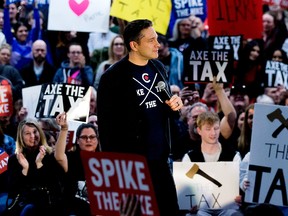The Conservatives saw a nine-point gain with young voters, a recent poll shows

In October, all eyes were on the Bloc Québécois and its leader Yves-François Blanchet, who had threatened to overthrow the Trudeau government if two bills were not passed, with one of them aiming to increase old age security benefits for everyone aged 65 and over.
At the time, the Bloc had a comfortable lead in the polls in Quebec. A Léger-Québecor poll put the separatists in the lead with 35 per cent in the province and even a thin lead among 18 to 34-year-olds that was essentially statistically tied with the Liberals and Conservatives at 25 per cent.
But as the debate around old age security came to the House of Commons and the notion of a generation gap emerged, the Bloc was on the defensive.
“Over the past few days, I have heard people go so far as to say that playing catch-up and returning some purchasing power to seniors will be terrible for young people,” Blanchet said at the time.
“Quebec’s young people, and I am very happy about this, have a standard of living, a level of prosperity and a level of wealth that we never could have imagined,” he added in response to a question from Green Party Leader Elizabeth May.
Now, in November, even though the Bloc is still comfortably in the lead with 35 per cent, Léger/Québecor has released an astonishing poll. In the 18-to-34 age group, the Bloc is now fourth with 15 per cent and the Conservatives are first with 33 per cent.
For the Conservatives, that’s a nine-point gain with this group of voters.
“Our common sense Conservative solutions resonate with young Quebecers, unlike the Bloc, which has nothing to offer to combat the rising cost of living and housing,” Conservative Leader Pierre Poilievre wrote on social media after the numbers were released. He said young people want the government to cut taxes and eliminate the GST on new homes to help them become homeowners.
“If conservative values are gaining popularity with young people, it’s because Justin Trudeau broke the promise of Canada by sacrificing the future of future generations with his inflationary policies that have doubled the cost of housing,” he added.
And the Bloc seems to have understood this. Yves-François Blanchet told the story of his own son, a 26-year-old college teacher, who recently told him that he would never be able to buy a house. Blanchet realized this and wanted to find solutions.
He noted that “urban youth under 25” tend to lean toward the political left on an individual level, rather than a collective level. And they face real “economic challenges and can no longer dream of a home for the family.”
“Ultimately, we need to engage these young people more and better,” he admitted.
It seems that the Conservatives have already understood this. Rodolphe Husny, a former advisor to Stephen Harper’s government, pointed out that for the past year, Poilievre has been targeting the vote of young Canadians, particularly on social media. If Quebecers resisted at first, that no longer seems to be the case.
“I think it’s just the result of over a year and more of very targeted communication from Mr. Poilievre on inflation, on the deficit, on the debt and especially on housing,” Husny said in an interview with the National Post.
In Quebec, the idea of a more conservative youth has gained ground. Since the release of the Léger poll earlier this week, the media has turned its attention to this group that previously seemed to be sidelined in public debate.
Sébastien Dallaire, executive vice-president of Léger for Eastern Canada, said the latest poll also shows a surge for the provincial Conservative Party. According to his data, there appears to be “a clear movement among 18 to 34-year-olds.”
But will that hold when an election is called? In Quebec, answering that question can be perilous. The electorate is notorious for changing quickly and dramatically in a very short period of time.
“Uniting the vote of the discontented is a possibility and that is what the Conservative Party could eventually bet on in Quebec because at the moment, there are a lot of discontented people,” Dallaire said.
But even with 24 per cent support, the Conservatives may struggle to elect a dozen MPs in this province. Pollsters and political insiders have found concentrated support for the party in the Quebec City area.
Even with this new support, the Conservatives are not guaranteed to add seats in the next election. For example, Chicoutimi-Le Fjord MP Richard Martel, who was first elected in 2018 in this nationalist region, is now behind Bloc candidate Marc St-Hilaire in a recent local poll by Segma.
In fact, the Bloc has a nearly 20-point lead over the Conservatives there. Polling aggregator 338Canada recently described this riding as a “toss-up” between the two parties.
In the meantime, the Bloc could bank on the vote-splitting in the province between the Liberals, the NDP and the Conservatives.
The outlook continues to be grim for the Liberals. They are now fighting for second place in their last stronghold in the country and, last month, they lost five points in the province.
“It’s still a little better, relatively speaking, in Quebec than elsewhere. But it’s difficult even in Quebec for Justin Trudeau,” said Dallaire.
National Post
[email protected]
Our website is the place for the latest breaking news, exclusive scoops, longreads and provocative commentary. Please bookmark nationalpost.com and sign up for our daily newsletter, Posted, here.